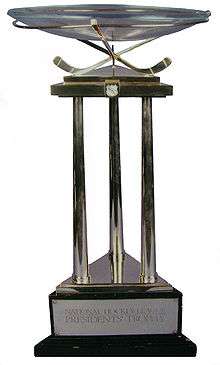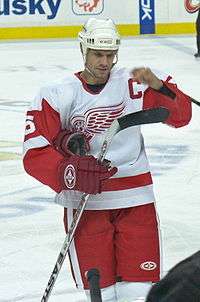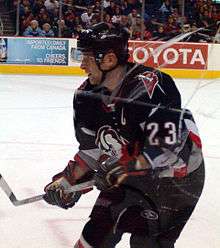Presidents' Trophy
 | |
| Award details | |
|---|---|
| Sport | Ice hockey |
| Given for | National Hockey League team with the most points (best record) in the regular season |
| History | |
| First award | 1985–86 NHL season |
| Most recent | Washington Capitals |
The Presidents' Trophy (French: Trophée des présidents) is an award presented by the National Hockey League (NHL) to the team that finishes with the most points (i.e. best record) during the NHL regular season. If two teams tie for the most points, then the Trophy goes to the team with the most wins. The Presidents' Trophy has been awarded 28 times to 15 different teams since its inception during the 1985–86 season.[1]
As the team with the best regular season record, the Presidents' Trophy winner is guaranteed home-ice advantage in all four rounds of the Stanley Cup playoffs, provided they advance that far. However, it does not guarantee that success; only eight of these winners have gone on to win the Stanley Cup. Three other teams reached the Stanley Cup Finals, but failed to win. The last team to win both the Presidents' Trophy and the Stanley Cup in the same season was the 2012–13 Chicago Blackhawks. The only team to accomplish this more than once is the Detroit Red Wings.
History
The Trophy was introduced at the start of the 1985–86 NHL season by the League's Board of Governors. Prior to this, the best team in the League during the regular season was allowed to hang a banner reading "NHL League Champions."[2]
A total of 15 teams have won the Presidents' Trophy. The Detroit Red Wings have won six Presidents' Trophies, the most of any team. The New York Rangers are second with three. Eight teams (Boston Bruins, Calgary Flames, Chicago Blackhawks, Colorado Avalanche, Dallas Stars, Edmonton Oilers, Vancouver Canucks, Washington Capitals) are tied for third most with two Presidents' Trophy wins apiece. Among these multiple winners, Calgary, Dallas, Detroit, Edmonton, and Vancouver have won it in consecutive seasons.
If there are two or more teams tied for first in points in the League, then the NHL's standard tiebreaking procedure is applied, with the first tiebreaker being the team with the most regulation and overtime wins (that is, all games won except those won in the shootout). Before the 2010–11 NHL season, the first tiebreaker was the most wins including shootout wins. An example of the pre-2010–11 protocol is from the 2006–07 season, where both the Buffalo Sabres and Detroit Red Wings finished first with 113 points. However, Buffalo had 53 wins while Detroit had 50, thus the Trophy was awarded to the Sabres.
Past trophies
From 1937 to 1967, the same criterion now observed for winning the Presidents' Trophy was used to award the Prince of Wales Trophy.[3] With the Modern Era expansion in the 1967–68 season and the creation of the West Division, the Wales Trophy was awarded to the team that finished in first place in the East Division during the regular season.[3] However, no trophy was awarded to the team that finished with the best overall record in the entire League during this period, and no trophy at all was awarded based on the results of the regular season from the 1981–82 through 1984–85 seasons. A cash bonus of $350,000 was awarded to the winning team with the NHL's best regular-season record during these years, to which the Presidents' Trophy was added in 1985–86.[1][4] The cash bonus is split amongst the players on the active roster of the winning team.
Factoring all NHL seasons prior to the introduction of the Presidents' Trophy, the Montreal Canadiens have finished first overall 21 times, the most times in League history (although this was most recently accomplished in 1977–78, before the Trophy was introduced; since its inception, the Canadiens have been Presidents' runners-up three times, in 1987–88, 1988–89, and 2014–15). Detroit is second with 18 first-overall finishes.[5]
Playoff implications
It is the reality of the sport. If your particular strength happens to be that you're really good offensively, and you come up against a hot goaltender and a team that is stout defensively, it might not matter that you were good on a nightly basis scoring goals. And that one particular opponent: you'll have to beat them four times.
NHL broadcaster Darren Eliot explaining the lack of success of Presidents' Trophy winners winning the Stanley Cup.[6]
The Presidents' Trophy winner is guaranteed home-ice advantage in all four rounds of the Stanley Cup playoffs, provided the team advances that far.[7] However, it does not guarantee that success, as only eight of all the Presidents' Trophy winners have gone on to win the Stanley Cup in their respective years, leading to a popular superstition that the Trophy may be cursed.[8][9][10] In addition, six Presidents' Trophy winners have been eliminated in the preliminary round of the playoffs, with first-round upsets being common in the NHL compared to other major professional sports.[11][12]
NHL broadcaster Darren Eliot attributes the apparent lack of playoff success to the different style of competition compared to the regular season: instead of playing different teams every night, the goal is to advance through four best-of-seven playoff series.[6] The Presidents' Trophy winner may have to go through other playoff clubs who might have a hotter goaltender, a better defensive team or other players that pose match-up problems. If the regular-season champion's primary success was merely outscoring others, they may be out of luck facing goaltenders that can shut them out.[6] The lack of playoff experience may have been to blame in the examples of the 1999–2000 St. Louis Blues and 2008–09 San Jose Sharks, as neither team had advanced past the second round for five or more seasons. Teams have often given up pursuit of finishing first in the League in order to avoid injuries and rest key players for the postseason.[13]
Ian Cooper, writing for the Toronto Star, noted that "of 11 Presidents' Trophy winners to lose in the first two rounds, seven came from divisions that were among the league’s weaker half ... If a team dominates a weak division, its shortcomings should become apparent once it faces stiffer competition from the rest of the conference".[14] Jonathan Weiss, writing for the Bleacher Report in 2010, also noted that of the teams between 1982 and 2009 that led the League in points during the regular season, 12 of them (45 per cent) reached the Cup Finals, while of the other 405 teams during that same time period, only 42 (10 per cent) advanced to the final round.[15]
Only three times in the history of the Presidents' Trophy has a team missed the playoffs the season after winning the award: the New York Rangers, who won the Trophy in the 1991–92 season missed the playoffs in 1992–93 (and then rebounded to win both the Presidents' Trophy and Stanley Cup in 1993–94); the Buffalo Sabres, who won the Trophy in the 2006–07 season missed the playoffs in 2007–08; and the Boston Bruins, who won the Trophy in the 2013–14 season missed the playoffs in 2014–15.
Winners



| Year | Winner | Points | Playoff Result | Win # |
|---|---|---|---|---|
| 1985–86 | Edmonton Oilers | 119 | Lost Division Finals (CGY) | 1 |
| 1986–87 | Edmonton Oilers | 106 | Won Stanley Cup (PHI) | 2 |
| 1987–88 | Calgary Flames | 105 | Lost Division Finals (EDM) | 1 |
| 1988–89 | Calgary Flames | 117 | Won Stanley Cup (MTL) | 2 |
| 1989–90 | Boston Bruins | 101 | Lost Stanley Cup Finals (EDM) | 1 |
| 1990–91 | Chicago Blackhawks | 106 | Lost Division Semifinals (MIN) | 1 |
| 1991–92 | New York Rangers | 105 | Lost Division Finals (PIT) | 1 |
| 1992–93 | Pittsburgh Penguins | 119 | Lost Division Finals (NYI) | 1 |
| 1993–94 | New York Rangers | 112 | Won Stanley Cup (VAN) | 2 |
| 1994–95 | Detroit Red Wings | 70[nb 2] | Lost Stanley Cup Finals (NJ) | 1 |
| 1995–96 | Detroit Red Wings | 131 | Lost Conference Finals (COL) | 2 |
| 1996–97 | Colorado Avalanche | 107 | Lost Conference Finals (DET) | 1 |
| 1997–98 | Dallas Stars | 109 | Lost Conference Finals (DET) | 1 |
| 1998–99 | Dallas Stars | 114 | Won Stanley Cup (BUF) | 2 |
| 1999–2000 | St. Louis Blues | 114 | Lost Conference Quarterfinals (SJ) | 1 |
| 2000–01 | Colorado Avalanche | 118 | Won Stanley Cup (NJ) | 2 |
| 2001–02 | Detroit Red Wings | 116 | Won Stanley Cup (CAR) | 3 |
| 2002–03 | Ottawa Senators | 113 | Lost Conference Finals (NJ) | 1 |
| 2003–04 | Detroit Red Wings | 109 | Lost Conference Semifinals (CGY) | 4 |
| 2004–05 | The Presidents' Trophy was not awarded due to the lockout that canceled the entire season. | |||
| 2005–06 | Detroit Red Wings | 124 | Lost Conference Quarterfinals (EDM) | 5 |
| 2006–07 | Buffalo Sabres | 113 | Lost Conference Finals (OTT) | 1 |
| 2007–08 | Detroit Red Wings | 115 | Won Stanley Cup (PIT) | 6 |
| 2008–09 | San Jose Sharks | 117 | Lost Conference Quarterfinals (ANA) | 1 |
| 2009–10 | Washington Capitals | 121 | Lost Conference Quarterfinals (MTL) | 1 |
| 2010–11 | Vancouver Canucks | 117 | Lost Stanley Cup Finals (BOS) | 1 |
| 2011–12 | Vancouver Canucks | 111 | Lost Conference Quarterfinals (LA) | 2 |
| 2012–13 | Chicago Blackhawks | 77[nb 3] | Won Stanley Cup (BOS) | 2 |
| 2013–14 | Boston Bruins | 117 | Lost Second Round (MTL) | 2 |
| 2014–15 | New York Rangers | 113 | Lost Conference Finals (TB) | 3 |
| 2015–16 | Washington Capitals | 120 | Lost Second Round (PIT) | 2 |
- ↑ The playoff format has changed over the years. See Stanley Cup playoffs for more information.
- ↑ Only 48 games were played in the 1994–95 season due to a lockout. Detroit's 70 points in 48 games extrapolates to 122 points in 84 games, which was the standard season length at the time.
- ↑ Only 48 games were played in the 2012–13 season due to a lockout. Chicago's 77 points in 48 games extrapolates to 132 points in an 82-game season.
Earlier best records
For reference, the following are teams that finished with the best records in the NHL for each season between 1917–18 and 1984–85.
NHL vs. PCHA/WCHL/WHL Stanley Cup era (1917–1926)
Prior to 1926–27, the Stanley Cup was then awarded as a "World Series" trophy between the champions of the NHL and a rival league (first the Pacific Coast Hockey Association, then the Western Canada Hockey League). Instead, the NHL championship trophy during this era was the O'Brien Trophy.
From 1917–18 to 1920–21, the NHL season was split, requiring separate standings, with a single playoff series between the winner of the first half of the season and the winner of the second half of the season.
| Year | Winner | Points[nb2 1] | Playoff Result |
|---|---|---|---|
| 1917–18 | Toronto Hockey Club | 26 | NHL Champion* |
| 1918–19 | Ottawa Senators | 24 | Lost NHL Championship (MTL)^ |
| 1919–20 | Ottawa Senators | 38 | NHL Champion, won Stanley Cup† |
| 1920–21 | Toronto St. Patricks | 30 | Lost NHL Championship (OTT)^ |
| 1921–22 | Ottawa Senators | 30 | Lost NHL Championship (TOR)^ |
| 1922–23 | Ottawa Senators | 29 | NHL Champion, won Stanley Cup† |
| 1923–24 | Ottawa Senators | 32 | Lost NHL Championship (MTL)^ |
| 1924–25 | Hamilton Tigers | 39 | Suspended from playoffs[nb2 2] |
| 1925–26 | Ottawa Senators | 52 | Lost NHL Final Round (MTM)^ |
- ↑ For the 1917–18 to 1920–21 seasons, this figure is the sum of the points accumulated during both halves of the season.
- ↑ A labour dispute between the Hamilton Tigers' owner and its players forced the team to be suspended from the playoffs.
NHL takes control of the Stanley Cup (since 1927)
After the 1925–26 season, the NHL became the only league left competing for the Stanley Cup. The Stanley Cup thus became the NHL champion trophy.
The Prince of Wales Trophy was awarded from 1938–39 to 1967 for the entire league regular season.
| Year | Winner | Points[nb3 1] | Playoff Result |
|---|---|---|---|
| 1926–27 | Ottawa Senators | 64 | Won Stanley Cup* |
| 1927–28 | Montreal Canadiens | 59 | Lost semi-finals (MTM) |
| 1928–29 | Montreal Canadiens | 59 | Lost semi-finals (BOS) |
| 1929–30 | Boston Bruins | 77 | Lost Stanley Cup Finals^ (MTL) |
| 1930–31 | Boston Bruins | 62 | Lost semi-finals (MTL) |
| 1931–32 | Montreal Canadiens | 57 | Lost semi-finals (NYR) |
| 1932–33 | Detroit Red Wings | 58 | Lost semi-finals (NYR) |
| 1933–34 | Toronto Maple Leafs | 61 | Lost semi-finals (DET) |
| 1934–35 | Toronto Maple Leafs | 64 | Lost Stanley Cup Finals^ (MTM) |
| 1935–36 | Detroit Red Wings | 56 | Won Stanley Cup* |
| 1936–37 | Detroit Red Wings | 59 | Won Stanley Cup* |
| 1937–38 | Boston Bruins | 67 | Lost semi-finals (TOR) |
| 1938–39 | Boston Bruins | 74 | Won Stanley Cup* |
| 1939–40 | Boston Bruins | 67 | Lost semi-finals (NYR) |
| 1940–41 | Boston Bruins | 67 | Won Stanley Cup* |
| 1941–42 | New York Rangers | 60 | Lost semi-finals (TOR) |
| 1942–43 | Detroit Red Wings | 61 | Won Stanley Cup* |
| 1943–44 | Montreal Canadiens | 83 | Won Stanley Cup* |
| 1944–45 | Montreal Canadiens | 80 | Lost semi-finals# (TOR) |
| 1945–46 | Montreal Canadiens | 61 | Won Stanley Cup* |
| 1946–47 | Montreal Canadiens | 78 | Lost Stanley Cup Finals^ (TOR) |
| 1947–48 | Toronto Maple Leafs | 77 | Won Stanley Cup* |
| 1948–49 | Detroit Red Wings | 75 | Lost Stanley Cup Finals^ (TOR) |
| 1949–50 | Detroit Red Wings | 88 | Won Stanley Cup* |
| 1950–51 | Detroit Red Wings | 101 | Lost semi-finals# (MTL) |
| 1951–52 | Detroit Red Wings | 100 | Won Stanley Cup* |
| 1952–53 | Detroit Red Wings | 90 | Lost semi-finals# (BOS) |
| 1953–54 | Detroit Red Wings | 88 | Won Stanley Cup* |
| 1954–55 | Detroit Red Wings | 95 | Won Stanley Cup* |
| 1955–56 | Montreal Canadiens | 100 | Won Stanley Cup* |
| 1956–57 | Detroit Red Wings | 88 | Lost semi-finals# (BOS) |
| 1957–58 | Montreal Canadiens | 96 | Won Stanley Cup* |
| 1958–59 | Montreal Canadiens | 91 | Won Stanley Cup* |
| 1959–60 | Montreal Canadiens | 92 | Won Stanley Cup* |
| 1960–61 | Montreal Canadiens | 92 | Lost semi-finals# (CHI) |
| 1961–62 | Montreal Canadiens | 98 | Lost semi-finals# (CHI) |
| 1962–63 | Toronto Maple Leafs | 82 | Won Stanley Cup* |
| 1963–64 | Montreal Canadiens | 85 | Lost semi-finals# (TOR) |
| 1964–65 | Detroit Red Wings | 87 | Lost semi-finals# (CHI) |
| 1965–66 | Montreal Canadiens | 90 | Won Stanley Cup* |
| 1966–67 | Chicago Black Hawks | 94 | Lost semi-finals# (TOR) |
| 1967–68 | Montreal Canadiens | 94 | Won Stanley Cup* |
| 1968–69 | Montreal Canadiens | 103 | Won Stanley Cup* |
| 1969–70 | Chicago Black Hawks | 99 | Lost semi-finals (BOS) |
| 1970–71 | Boston Bruins | 121 | Lost quarter-finals# (MTL) |
| 1971–72 | Boston Bruins | 119 | Won Stanley Cup* |
| 1972–73 | Montreal Canadiens | 120 | Won Stanley Cup* |
| 1973–74 | Boston Bruins | 113 | Lost Stanley Cup Finals^ (PHI) |
| 1974–75 | Philadelphia Flyers | 113 | Won Stanley Cup* |
| 1975–76 | Montreal Canadiens | 127 | Won Stanley Cup* |
| 1976–77 | Montreal Canadiens | 132 | Won Stanley Cup* |
| 1977–78 | Montreal Canadiens | 129 | Won Stanley Cup* |
| 1978–79 | New York Islanders | 116 | Lost semi-finals (NYR) |
| 1979–80 | Philadelphia Flyers | 116 | Lost Stanley Cup Finals^ (NYI) |
| 1980–81 | New York Islanders | 110 | Won Stanley Cup* |
| 1981–82 | New York Islanders | 118 | Won Stanley Cup* |
| 1982–83 | Boston Bruins | 110 | Lost Conference Finals (NYI) |
| 1983–84 | Edmonton Oilers | 119 | Won Stanley Cup* |
| 1984–85 | Philadelphia Flyers | 113 | Lost Stanley Cup Finals^ (EDM) |
- ↑ Notwithstanding seasons shortened by labour or other similar issues, the regular season consisted of 44 games from 1926–27 to 1930–31 seasons, 48 games from 1931–32 to 1941–42, 50 games from 1942–43 to 1945–46, 60 games from 1946–47 to 1948–49, 70 games from 1949–50 to 1966–67, 74 games from 1967–68 to 1968–69, 76 games during the 1969–70 season, 78 games from 1970–71 to 1973–74, and 80 games from 1974–75 to 1991–92. The 1992–93 and 1993–94 seasons had 84 games, with two games played at neutral sites; neutral-site games were eliminated for the 1995–96 season.
See also
- Continental Cup, a KHL trophy having the same function as the Presidents' Trophy.
- Supporters' Shield, a MLS trophy having the same function as the Presidents' Trophy.
References
- General
- "Presidents' Trophy history". NHL. Retrieved September 15, 2007.
- "Presidents' Trophy history". LegendsofHockey.net. Retrieved September 15, 2007.
- "Stanley Cup Champions and Finalists". NHL. Retrieved September 15, 2007.
- Specific
- 1 2 "Presidents' Trophy history". NHL.com. Retrieved September 5, 2007.
- ↑ "Presidents Trophy Buffalo Bound". NHL.com. Retrieved October 10, 2009.
- 1 2 "History of the Prince of Wales Trophy". Legends of Hockey.net. Retrieved September 5, 2007.
- ↑ "Presidents' Trophy". NHL.com. Retrieved September 15, 2007.
- ↑ "Final Standings". NHL.com. Retrieved September 15, 2007.
- 1 2 3 Darren Eliot (April 7, 2010). Inside Report: Presidents' Trophy to curse Caps?. SI.com. Retrieved March 30, 2011.
- ↑ McGourty, John (June 11, 2009). "Keenan knows Game 7 pressure". NHL.com. Retrieved October 22, 2010.
- ↑ Rosen, Dan (April 12, 2009). "A short-term celebration". NHL.com. Retrieved April 29, 2010.
- ↑ Bialik, Carl (April 20, 2009). "The Count: The Myth of the President's Trophy Curse". Wall Street Journal. Retrieved April 1, 2011.
- ↑ "'Irritated' Caps look for answers". Washington Times. March 31, 2010. Retrieved April 1, 2011.
Then there's the so-called Presidents' Trophy curse: Only seven of 23 teams that have won that piece of hardware have gone on to win the Stanley Cup.
- ↑ Klein, Jeff Z.; Hackel, Stu (April 12, 2009). "First-Round Upsets Common in N.H.L". The New York Times.
- ↑ "Expect the unexpected in NHL playoffs". The Globe and Mail. Toronto. April 27, 2013.
- ↑
- ↑ Ian Cooper (April 10, 2014). "Why the NHL Presidents' Trophy curse is a myth: Department of Hockey Analytics". Toronto Star. Retrieved April 14, 2015.
- ↑ Jonathan Weiss (April 4, 2010). "The Curse of the Presidents' Trophy: Fact or Fiction?". Bleacher Report. Retrieved April 14, 2015.